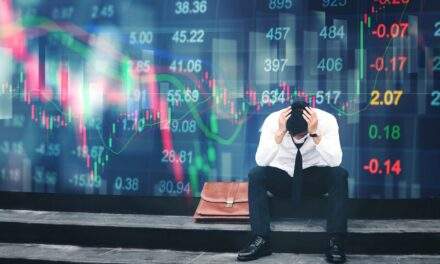“Sell me out NOW!”
It was the summer of 2008.
The worst of the financial crisis was about to come. But already there was a lot of pain…
The stock market was down 20% since its all-time high in October 2007. Many stocks were down much more.
I was just starting my day when my father called.
He’d just received his monthly statement. And one of his largest positions — a stock I had recommended to him — was down 30% on the year.
He wanted to sell right then. He was afraid the stock would go to zero.
It didn’t matter that he had more than doubled his money since he bought it.
I tried reasoning with him, but we were wasting both of our time. He didn’t want to hear it.
So, I sold the shares out of his Schwab account at around $150 per share.
A few years later, the stock was trading at $500 per share.
He said it didn’t bother him, but I know it did. We never brought up the subject again. It was still too raw to discuss.
Pop had acted irrationally and missed out on a huge amount of profits.
But he wasn’t the only one. Many investors panicked and sold during that time — and kicked themselves later…
Replace Wiring
When people lose money, it hurts.
The pain of even potentially losing $100 is much greater for them than the joy of finding $100.
Behavioral economists refer to this as loss aversion.
It’s hard to fight because scientists say, as humans, we’re hardwired to feel this way.
And I totally get it.
During the 1987 crash — when the stock market fell 22% in one day — I saw fear close up. I got all my clients out of the crash two weeks before.
But I saw colleagues of mine freak out. Fear overtook them, and they sold when they should’ve been buying.
During the financial crisis of 2008, I was buying throughout the downturn. And my clients and I ended up a whole lot richer.
The stock market stopped falling on March 9, 2009. Over the next 11 years, the S&P 500 Index soared more than 400%.
Unfortunately, many investors — like my dad — sold in 2008 and didn’t come along for that ride. But if you were one of them, it’s not your fault. The feelings of loss aversion are natural.
The trick is learning to overcome it by seeing stocks as pieces of a business. Only then can you see market sell-offs as opportunities to buy…
Deep Breath
Emotions can really mess you up. But instead of letting your gut decide what to do, take a breath.
Because over time the stock price follows the worth of the business … not the other way around.
As long as the business is doing well, the stock price will eventually follow.
Since the start of the year, Mr. Market has been very volatile and mainly to the downside. But that just means it’s giving us a great buying opportunity right now.
Several of the stocks in our model portfolio are trading below their buy-up-to prices at attractive levels.
And I’m working on releasing my next Alpha Investor recommendation soon. You won’t want to miss it.
Regards,

Founder, Alpha Investor
P.S. I don’t want you to miss out on our Alpha Investor shopping list. So, if you’re not a part of the family yet, be sure to check out how you can join us right here.










